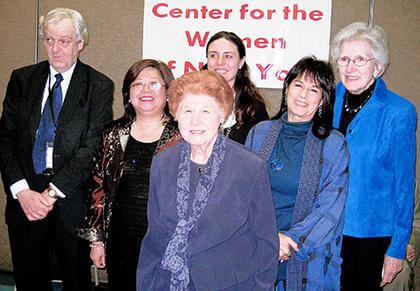By Anna Gustafson
Now that Queens has become a gateway for sex and human trafficking in part because of its two international airports, law enforcement, nonprofits and the media need to work in concert to combat the exploitation that happens just under borough residents’ noses, according to panelists at Queens Borough Hall last week.
“Queens County-based JFK International and LaGuardia airports and the major national highways offer easy entry to the U.S., New York City and metropolitan area market,” said Karen Siegel, a psychologist who works with women and girls who have been trafficked. “The U.S. Department of Justice designated the I-95 corridor as a major route for human trafficking.”
Siegel was one of four panelists at a forum on trafficking at Borough Hall March 2. The Center for the Women of New York and the Queens chapter of the United Nations Association-USA sponsored the two-hour event, which addressed ways to fight the exploitation and help those who are victims of a trafficking movement that ensnares about 800,000 people — many of them women and children — worldwide annually, according to statistics from the U.S. government.
“What these people are facing is so tough you would not imagine this could happen to a human being,” said Susan Jeng, the founder and executive director of the Flushing-based Rivers in the Desert Advocacy Center. “Hopefully, everyone will do something about this, and not just say, ‘Oh, this is so sad.”
Jennifer Dreher, senior director of the anti-trafficking program at Safe Horizon, said the trafficked individuals they work with have gone through traumatic experiences, such as the intolerable life endured by victims Sierra Leone’s decade-long civil war. Dreher worked with women in post-war Sierra Leone.
“The children of the traffickers will beat the women and treat them like animals,” Dreher said. “They have to sleep in a dog bed, they’re cut and tortured. They tell the women if they leave, they’ll kill the woman’s children.”
The U.S. Department of Justice estimates between 14,500 and 17,500 women, children and men are trafficked into this country every year and it is likely individuals walking around New York City have encountered victims without even knowing it, Dreher said.
“When people think of trafficking, they think of people chained to a bed, but the majority of people we work with are out and about in the community,” Dreher said. “So take that extra minute to talk to somebody and notice why they will only talk to that one man, or why there always seems to be a boss hovering over them, or why somebody sleeps in the back of a restaurant.”
In Queens, those attending the conference said Roosevelt Avenue in Jackson Heights and areas in Flushing have become especially busy hubs for trafficked individuals. Queens Assistant District Attorney Anthony Communiello said law enforcement officials have in recent years tried to target traffickers instead of prostitutes.
“We started looking at this issue in the 1990s, and we saw law enforcement was doing massive sweeps and arresting dozens of prostitutes,” he said. “It is hard to prosecute those who do the exploiting.”
Despite the hardships of finding pimps as opposed to the prostitutes, Communiello said officials are able to and highlighted the story of David Brown, the first person to be sentenced under New York state’s new sex trafficking laws in early February.
Brown, of St. Albans, was sentenced to 25 years to life in prison on charges he purchased a 19-year-old girl for $2,000 in August 2008 and forced her into prostitution.
CWNY President Ann Jawin said advertisements in local Queens newspapers for companies that often employ women and girls who have been forced into sex work prompted the forum.
“I’ve seen the sensational ads in some of our local papers, and we need to ask our community publishers not to accept these ads,” Jawin said. “We need to let the store owners where they sell these papers know of the ads and say you won’t shop there if they continue to sell those papers.”
Reach reporter Anna Gustafson by e-mail at agustafson@cnglocal.com or by phone at 718-260-4574.



































